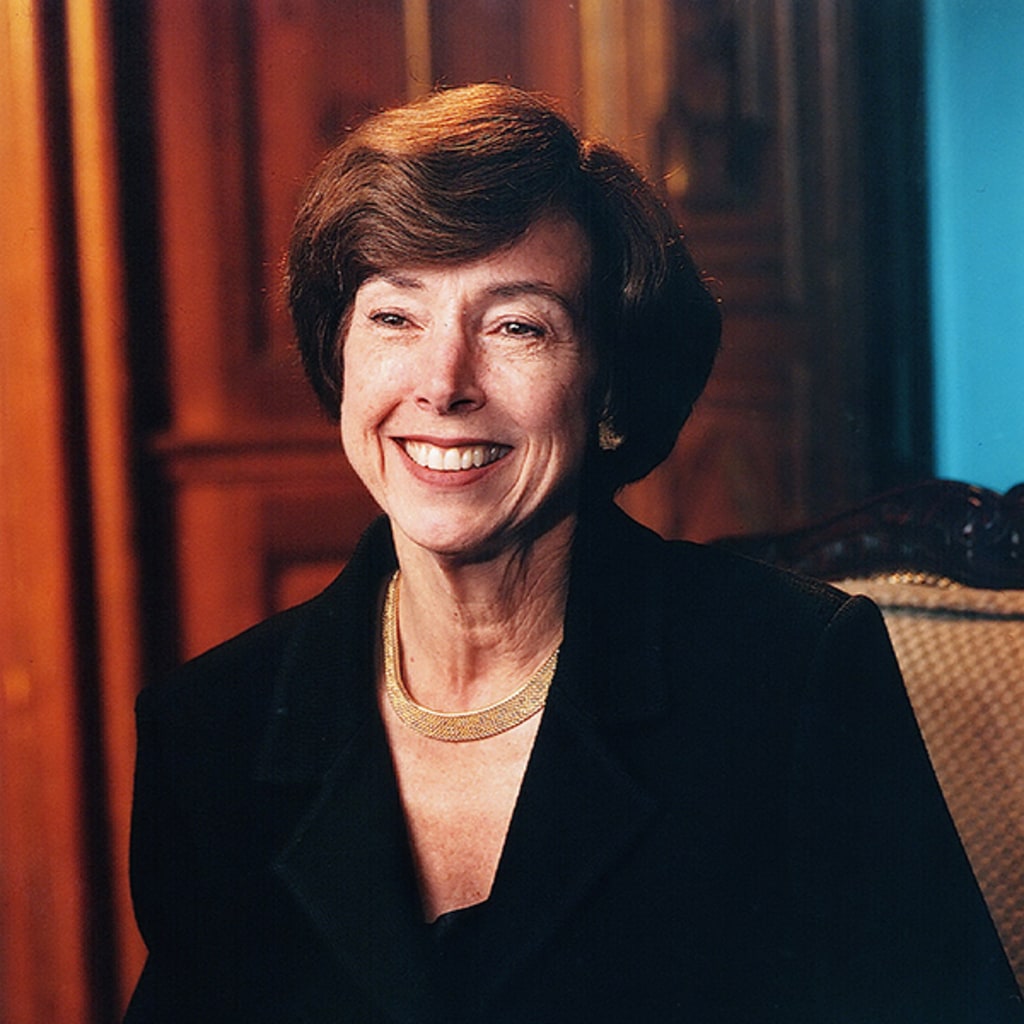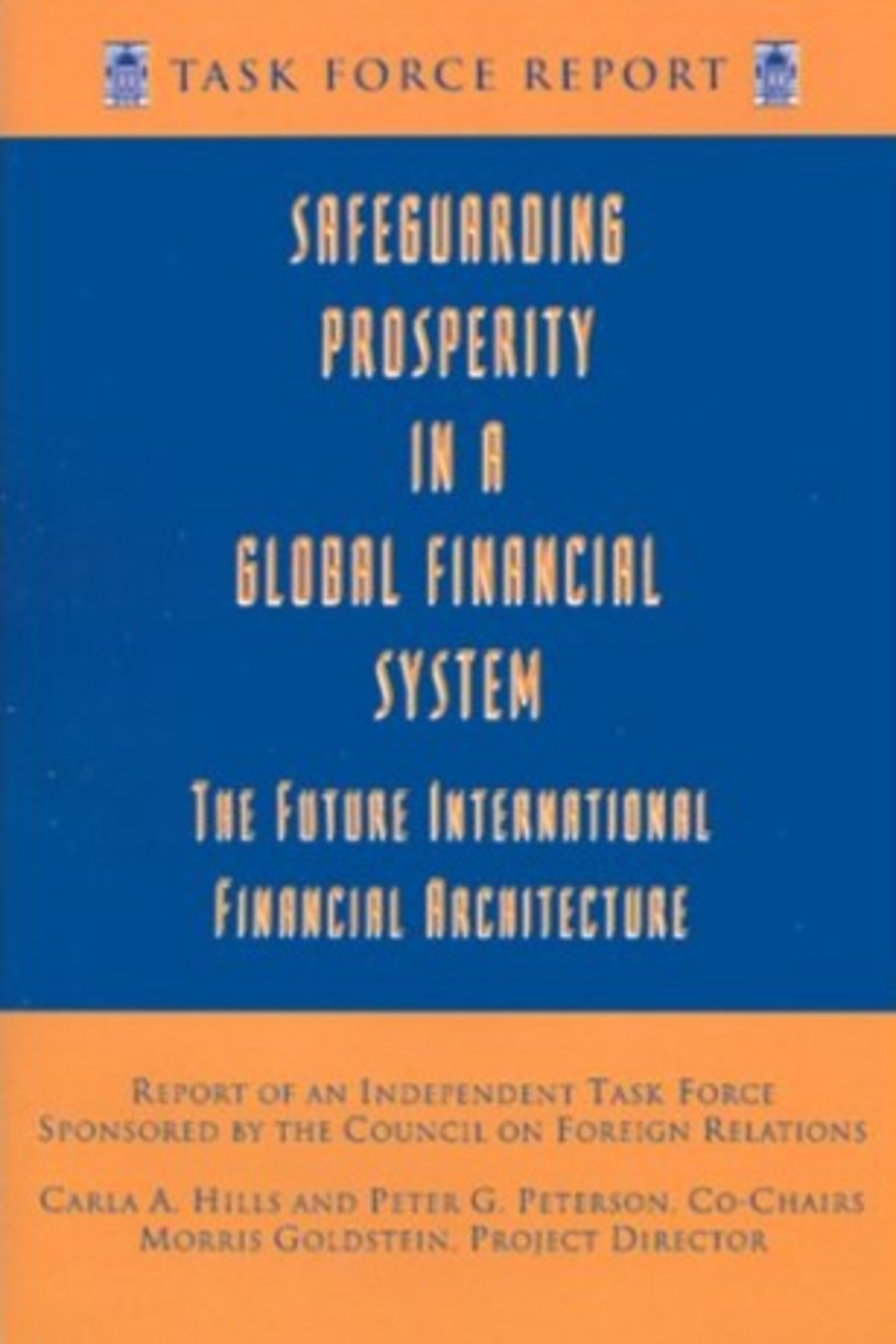Task Force Report No. #25
Safeguarding Prosperity in a Global Financial System
The Future International Financial Architecture
![]() Carla A. HillsCochair
Carla A. HillsCochair- Peter G. PetersonCochair
- Morris GoldsteinDirector
What are Task Force Reports?
CFR sponsors Task Forces to assess issues of critical importance to U.S. foreign policy to reach bipartisan consensus on policy recommendations.
Who makes them?
Task Force members aim to reach a meaningful consensus on policy and are solely responsible for the content of their report.
The international community will not make real headway in crisis prevention if private creditors—and particularly large commercial banks—can escape from bad loans to emerging economies at relatively low cost, according to this independent Task Force report. The International Monetary Fund (IMF) should therefore return to smaller rescue packages for country crises that do not threaten the performance of the global financial system. In extreme cases, the IMF should also require as a condition for its own emergency assistance that debtors be engaged in serious and fair discussions on debt rescheduling with their private creditors.
The Task Force believes that the primary responsibility for crisis prevention and management in emerging economies should be placed on emerging economies themselves and on the private lenders and investors that dominate today’s international capital markets.
Strengthening the international financial architecture in this and complementary ways would advance U.S. national interests, since the economy is now connected much more closely to the rest of the world than it was twenty or thirty years ago. The U.S. economy performed impressively throughout the Asian crisis because our domestic spending was strong and inflation was low. Next time the United States may not be so well-positioned to weather the storm.
Task Force Members
Task Force Members:
Paul A. Allaire is chairman and chief executive officer of Xerox Corporation. He joined Xerox in 1966, serving in a variety of senior posts, and was elected president and a member of the board in 1986.
C. Fred Bergsten has been director of the Institute for International Economics since its creation in 1981. He served at the Treasury Department as assistant secretary for international affairs from 1977-81, and at the National Security Council as assistant for international economic affairs from 1969-71.
Kenneth W. Dam is Max Pam professor of American and foreign law at the University of Chicago. He was deputy secretary of state from 1982-85.
George David is chairman and chief executive officer of United Technologies Corporation. He joined Otis Elevator Company in 1975, just prior to the merger of Otis into United Technologies.
Jorge I. Dominguez is director of the Weatherhead Center for International Affairs and Clarence Dillon professor of international affairs at Harvard University. He is a former president of the Latin American Studies Association.
Kenneth M. Duberstein is chairman and chief executive officer of the Duberstein Group, an independent strategic planning and consulting company. He served as chief of staff to President Reagan from 1988-89.
Barry Eichengreen is John L. Simpson professor of economics and political science at the University of California, Berkeley, where he has taught since 1987. He was senior policy adviser at the International Monetary Fund from 1997-98.
Martin Feldstein is George F. Baker professor of economics at Harvard University and president of the National Bureau of Economic Research. He was chairman of the Council of Economic Advisers and President Reagan’s chief economic adviser from 1982-84.
Morris Goldstein is Dennis Weatherstone senior fellow in international finance at the Institute for International Economics. He served as a staff member of the International Monetary Fund for twenty-five years, the last eight as deputy director of the Fund’s research department.
Maurice R. Greenberg is chairman and chief executive officer of American International Group, Inc., and vice chairman of the Council on Foreign Relations. He is a past chairman, deputy chairman, and director of the Federal Reserve Bank of New York.
Lee H. Hamilton is director of the Woodrow Wilson International Center for Scholars. Mr. Hamilton served as a member of Congress from the ninth district of Indiana from 1965-99 and chaired the House Foreign Affairs Committee.
John G. Heimann is chairman of the Financial Stability Institute, a subsidiary of the Bank of International Settlements. He was chairman of Global Financial Institutions at Merrill Lynch and Co., Inc.
Carla A. Hills is chairman and chief executive officer of Hills and Company, an international consulting firm. She was United States trade representative from 1989-93.
Peter B. Kenen is Walker professor of economics and international finance at Princeton University. He taught at Columbia University from 1957-71, where he was chairman of the department of economics, and provost of the University from 1969-70.
Paul R. Krugman is Ford international professor of economics at the Massachusetts Institute of Technology. He was international policy economist for the Council of Economic Advisers from 1982-83.
Nicholas R. Lardy is senior fellow in foreign policy studies at the Brookings Institution and Frederick Frank adjunct professor of international trade and finance at Yale University’s School of Management. He was director of the Henry M. Jackson School of International Studies at the University of Washington from 1991-95.
David A. Lipton is senior associate at the Carnegie Endowment for International Peace’s Global Policy Program. He served in several senior positions at the Treasury Department from 1993-98, most recently as undersecretary for international affairs.
Ray Marshall is Audre and Bernard Rapoport centennial chair in economics and public affairs at the University of Texas at Austin. He was secretary of labor from 1977-81.
Norman J. Ornstein is resident scholar at the American Enterprise Institute for Public Policy Research and election analyst for CBS News. In addition, he writes regularly for USA Today as a member of its board of contributors and writes a column called “Congress Inside Out” for Roll Call.
Peter G. Peterson is chairman of The Blackstone Group and chairman of the Council on Foreign Relations. A former secretary of commerce, he is vice chairman of the Federal Reserve Bank of New York, founding chairman of the Institute for International Economics, and founding president of The Concord Coalition.
William R. Rhodes is vice chairman of Citigroup/Citicorp/Citibank. He is also senior international officer for Citigroup. He joined Citibank in 1957 and served in many posts there, including as senior executive-international, before being named director and vice chairman in 1991.
Stephen S. Roach is managing director of Morgan Stanley Dean Witter and Co. and chief economist and director of global economic analysis. Prior to joining Morgan Stanley in 1982, he was vice president for the Morgan Guaranty Trust Company.
Henry B. Schacht is director and senior adviser of Lucent Technologies. He served as the company’s first chairman and chief executive officer from 1995-97. He was chairman and chief executive officer of Cummins Engine Company from 1977-95.
James R. Schlesinger is senior adviser at Lehman Brothers and counselor to the Center for Strategic and International Studies. He was director of central intelligence in 1973, secretary of defense from 1973-75, and the first U.S. secretary of energy from 1977-79.
George Soros is chairman of Soros Fund Management LCC. He funds a network of foundations dedicated to building and maintaining the infrastructure and institutions of an open society.
Laura D’Andrea Tyson is BankAmerica dean, Walter A. Haas School of Business, the University of California, Berkeley. She was chair of the Council of Economic Advisers and National Economic Adviser to President Clinton. She has also served on the president’s National Security and Domestic Policy Councils.
Ezra F. Vogel is Henry Ford II professor of the social sciences at Harvard, director of the Fairbank Center for East Asian Research at Harvard, and director of the Harvard University Asia Center.
Paul A. Volcker is Henry Kaufman visiting professor at New York University’s Stern School of Business. He retired as chairman and chief executive officer of James D. Wolfensohn and Co., Inc., upon the merger of that firm in 1996 with the Bankers Trust company, of which Mr. Volcker became a director. He was chairman of the board of governors of the Federal Reserve System from 1979-87.
Vin Weber is a partner at Clark and Weinstock. He was a co-founder and co-director of Empower America, a nonprofit organization that deals with economic, social welfare, and educational problems. He represented Minnesota in the United States House of Representatives from 1980-92.







